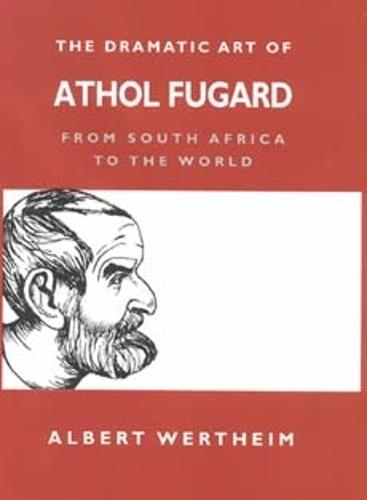Full Product Details
Author: Albert Wertheim
Publisher: Indiana University Press
Imprint: Indiana University Press
Dimensions:
Width: 15.60cm
, Height: 2.10cm
, Length: 23.50cm
Weight: 0.494kg
ISBN: 9780253215048
ISBN 10: 0253215048
Pages: 296
Publication Date: 28 September 2001
Audience:
College/higher education
,
Professional and scholarly
,
Undergraduate
,
Professional & Vocational
Format: Paperback
Publisher's Status: Active
Availability: In Print

This item will be ordered in for you from one of our suppliers. Upon receipt, we will promptly dispatch it out to you. For in store availability, please contact us.
Reviews
Albert Wertheim's study of Fugard's plays is both extremely insightful and beautifully written - a book that held my attention from beginning to end. It was a pleasure to read! Wertheim succeeds in communicating the greatness of Fugard as a playwright, actor, and director. He also conveys well what Fugard has learned from other plays and dramatists. Thus, he places Fugard's works not so much in a South African context as in a theatrical context. He also illuminates his interpretations with the help of Fugard's manuscripts, previously available only in South Africa. This book is aimed not only at teachers, students, scholars, and performers of Fugard but also at the person who simply loves going to see a Fugard play at the theatre. - Nancy Topping Bazin, Eminent Scholar and Professor Emeritus, Old Dominion University
""Albert Wertheim's study of Fugard's plays is both extremely insightful and beautifully written - a book that held my attention from beginning to end. It was a pleasure to read! Wertheim succeeds in communicating the greatness of Fugard as a playwright, actor, and director. He also conveys well what Fugard has learned from other plays and dramatists. Thus, he places Fugard's works not so much in a South African context as in a theatrical context. He also illuminates his interpretations with the help of Fugard's manuscripts, previously available only in South Africa. This book is aimed not only at teachers, students, scholars, and performers of Fugard but also at the person who simply loves going to see a Fugard play at the theatre."" - Nancy Topping Bazin, Eminent Scholar and Professor Emeritus, Old Dominion University
"""Albert Wertheim's study of Fugard's plays is both extremely insightful and beautifully written - a book that held my attention from beginning to end. It was a pleasure to read! Wertheim succeeds in communicating the greatness of Fugard as a playwright, actor, and director. He also conveys well what Fugard has learned from other plays and dramatists. Thus, he places Fugard's works not so much in a South African context as in a theatrical context. He also illuminates his interpretations with the help of Fugard's manuscripts, previously available only in South Africa. This book is aimed not only at teachers, students, scholars, and performers of Fugard but also at the person who simply loves going to see a Fugard play at the theatre."" - Nancy Topping Bazin, Eminent Scholar and Professor Emeritus, Old Dominion University"
Wertheim (Indiana Univ.) identifies South African playwright Athol Fugard as arguably the most distinguished living English-language playwright. Some of Fugard's best-known plays include The Blood Knot, Sizwe Bans Is Dead, A Lesson from Aloes, and Master Harold. and the Boys, and Wertheim notes in his introduction that he has seen performances of almost all of Fugard's canon (the exceptions: No-Good Friday, Nongogo, and Dimetos). The subject of Fugard's plays is often the human toll [that] racism leaves in its wake, wherever it is practiced. According to Wertheim, one of the larger, existential truths of Fugard's plays is the capacity of humankind not only to endure but to transcend its tragic fate; Fugard's parabolic style enables him to provide a general insight open to many applications. Wertheim's study has two particular strengths (among many): its insight into the evolution of the playwright, especially the influence of Albert Camus, Bertolt Brecht, and Samuel Beckett on Fugard's canon, and its illumination of the symbolic props in the plays, e.g., the shoes and stockings in People Are Living There. An authoritative work superbly written, this book is well suited to upper-division undergraduates and above.T. L. Jackson, St. Cloud State University, Choice, November 2001 Wertheim's study has two particular strengths (among many): its insight into the evolution of the playwright, especially the influence of Albert Camus, Bertolt Brecht, and Samuel Beckett on Fugard's canon, and its illumination of the symbolic props in the plays, e.g., the shoes and stockings in People Are Living There. An authoritative work superbly written, this book is well suited to upper-division undergraduates and above. -Choice, November 2001
Author Information
Albert Wertheim is Professor of English and of Theatre and Drama at Indiana University. He has published widely on modern and classic British and American drama and on post-colonial writing; directed several NEH seminars on politics in the theatre and on new literatures from Africa, the West Indies, and the Pacific; and served on the editorial boards of American Drama, Theatre Survey, South African Theatre Journal, and Westerly.



